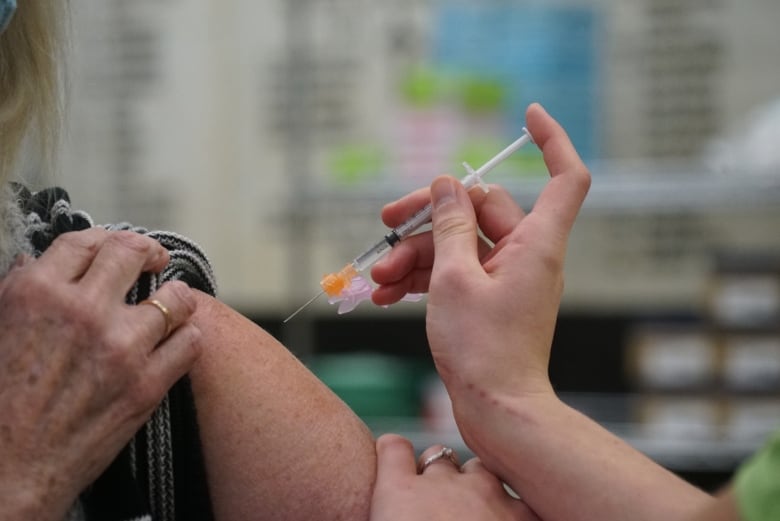The doldrums and devastation of pandemic life will end eventually, experts say. However, some of them also think the virus behind COVID-19 will remain as a presence in our lives along some spectrum ranging from occasional flare-ups to a seasonal illness, or something in between.

As the months passed in 2020, and a mysterious new virus spread around the world, prompting lockdowns and whirlwind scientific research, it was hard to shake one burning question: Was COVID-19 ever going away?
Now, in many places, after weeks of climbing case counts, infections and deaths are finally dropping again. Millions of people are getting vaccinated around the world. And here in Canada, shipments of doses are scaling up as provinces are rolling out long-awaited vaccination plans.
It’s a time for hope. But there is also a renewed sense of uncertainty.
The downward case trends could soon reverse thanks to several fast-spreading variants, which show this coronavirus is capable of shrewdly shape-shifting and, potentially, evading our current slate of vaccines. And those shots? Many countries don’t have a single dose, leaving millions of people vulnerable.
Against that backdrop, answers are finally emerging to the question that’s haunted much of the world since before SARS-CoV-2 had a name.
Yes, this pandemic will end.
But after having so many months to spread and evolve, this virus — and the illness it can cause — will likely be with us, to some degree, for years to come.
“We’re not going to vaccinate our way to getting COVID off the face of the earth,” warned Dr. Zain Chagla, an infectious disease specialist and professor at McMaster University in Hamilton.

He’s not alone in making that prediction. Yet, it’s not as dire as it sounds.
The doldrums and devastation of pandemic life have an expiry date, experts tend to agree, while the virus behind COVID-19 could remain as a constant presence along some spectrum ranging from occasional flare-ups to a seasonal illness, or something in between.
“Cold, flu and COVID,” Chagla said. “You know, at the end of the day, it may just be one of these illnesses.”
‘Very hard’ to control virus, even with vaccines
Those outcomes seem more likely because, by this point in the pandemic, the virus has touched down in countries around the world, ranging from landlocked nations to remote regions to islands like New Zealand and Australia.
With that amount of human hosts, it’s now hard to imagine stamping out every trace.
“The virus has been circulating in people for too long for us to eradicate it with a vaccine,” said Alyson Kelvin, a vaccinologist with VIDO-InterVac in Saskatoon.
It’s a challenging combination of the virus’s vast spread, Chagla said, and the fact it causes a respiratory illness with a pre-symptomatic phase where people can spread the virus unknowingly.
“It’s very, very hard — even with vaccines — to control it.”
That’s in part because many countries are far behind on vaccination efforts, and for some, shots remain months or even years away. Any pockets of unvaccinated populations could see a longer tail to the pandemic, or outbreak flare-ups, well after the countries that are rapidly vaccinating citizens.

“Then, certainly, that would allow for the selection of new variants, which could potentially come back into a vaccinated population,” said Angela Rasmussen, a virologist at Georgetown University’s Center for Global Health Science and Security in Washington, D.C.
“So I think that we’ve been very short-sighted in how we’ve thought about vaccination as a control strategy on a national scale rather than a global one.”
Even through previous, decades-long global vaccination efforts, we haven’t eradicated the vast majority of pathogens, she said.
Animal reservoirs also remain widely available for SARS-CoV-2, Kelvin said, with reports of minks and cats both being infected, for instance, offering ample hosts beyond the human variety.
WATCH | New research suggests Pfizer-BioNTech vaccine could curb transmission:

New research conducted in Israel shows that if a person is infected with COVID-19 after receiving a single dose of the Pfizer-BioNtech vaccine there’s less coronavirus in the system, and that could mean the vaccine may help prevention transmission. 1:55
COVID-19 could become a seasonal illness
It’s not an ideal-sounding future: a virus that’s basically everywhere, popping up in different countries and animals and who knows where next.
But the all-consuming lockdowns and hardship of the past year likely won’t be sticking around post-pandemic, experts told CBC News.
That’s because, as Chagla put it, this virus could become part of regular life in a way that, for most of us, won’t be top of mind, at least not very often.
“You’ll probably see this circulate again, as something that will drive people to hospital from time to time, but hopefully not overwhelm health-care systems,” he said.
And Chagla anticipates we’ll still see long-term care outbreaks of COVID-19, but hopefully never to the degree of hospitalizations and deaths that shook Canadian families throughout much of 2020 and so far in 2021.

“I think that will become a seasonal disease like the flu where, you know, you’ll probably get a vaccine every year, maybe two to three years,” said Dr. Saahir Khan, an assistant clinical professor of infectious diseases at the University of Southern California’s Keck School of Medicine.
“And I think the mortality rate will go down — and had already gone down a lot — as we get better at treating it.”
Rasmussen agreed there’s potential for COVID-19 to one day be more like influenza. That also makes it tough to predict exactly how the virus will operate.
“A lot of people assume that when a virus becomes endemic, it also becomes attenuated,” she said, referring to the process where an infectious agent becomes weaker, and potentially even harmless.
But when it comes to influenza, there can also be emergent strains that are more pathogenic and have higher mortality rates than your typical seasonal flu.
“And flu is different, also, because every year there’s different flu strains going around,” Rasmussen said.
There’s also the possibility SARS-CoV-2 could wind up something like its milder family members — common cold coronavirus — by mutating every couple of years to evade population immunity, then infecting people again, then mutating after its hosts developed immunity to that new strain.
“Then the cycle would repeat itself,” Rasmussen said. “I think that something like that could certainly happen with COVID. The good news, though, is that if that does happen, we should be able to protect people by giving them booster vaccinations.”
WATCH | WHO says wealthier countries buying up too much vaccine supply:

The wealthier countries of the world are buying up too much of the COVID-19 vaccine supply and leaving too little for poorer countries, says WHO Director-General Tedros Adhanom Ghebreyesus. 0:57
Booster shots in development
Various vaccine manufacturers are already racing to develop booster shots after research suggested several types of shots might falter against the highly contagious coronavirus variant first discovered in South Africa, known as B1351.
Kelvin stressed that, for Canada — a country so far plagued by vaccine shipment delays — ongoing support for homegrown vaccine research like hers will be crucial.
“We’ll really have to rely on our Canadian innovation and our Canadian ability to make vaccines and make them quickly,” she said. “Especially if the virus is changing, we’ll need that here.”
While the future still remains uncertain — and this pandemic often feels like it’s dragging on indefinitely — post-pandemic life for Canadians is within reach, faster than many imagined, she said.
She pointed to the 1918 flu pandemic, caused by an H1N1 virus, which ravaged the world for nearly 2½ years and claimed up to 100 million lives during four successive waves.
“I think if we look back on that, which is hard to do in our modern society, we’re moving at much better speed, we have a … decreased casualty rate,” she said.
“So, in a way, we’re doing a lot better than they did.”
